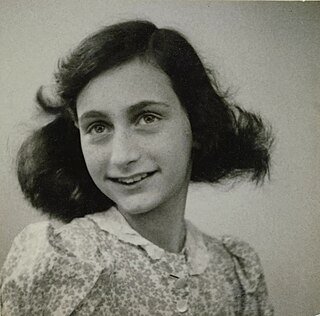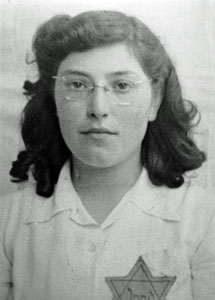
Camp Westerbork, also known as Westerbork transit camp, was a Nazi transit camp in the province of Drenthe in the Northeastern Netherlands, during World War II. It was located in the municipality of Westerbork, current-day Midden-Drenthe. Camp Westerbork was used as a staging location for sending Jews, Sinti and Roma to concentration camps elsewhere.

Annelies Marie "Anne" Frank was a German-born Jewish girl who kept a diary documenting her life in hiding amid Nazi persecution during the German occupation of the Netherlands. A celebrated diarist, Frank described everyday life from her family's hiding place in an Amsterdam attic. She gained fame posthumously and became one of the most-discussed Jewish victims of the Holocaust with the 1947 publication of The Diary of a Young Girl, which documents her life in hiding from 1942 to 1944. It is one of the world's best-known books and has been the basis for several plays and films.

Anne Frank Remembered is a 1995 British documentary film produced and directed by Jon Blair about the life and posthumously published diary of the German-Jewish diarist Anne Frank, who spent most of her life in the Netherlands. The film was produced in association with the Anne Frank House, Disney Channel, and the BBC, and features narration by Kenneth Branagh and extracts from Frank's diary read by Glenn Close. It originally aired on television in April 1995 before it was screened theatrically by Sony Pictures Classics in February 1996.

The Diary of a Young Girl, commonly referred to as The Diary of Anne Frank, is a book of the writings from the Dutch-language diary kept by Anne Frank while she was in hiding for two years with her family during the Nazi occupation of the Netherlands. The family was apprehended in 1944, and Anne Frank died of typhus in the Bergen-Belsen concentration camp in 1945. Anne's diaries were retrieved by Miep Gies and Bep Voskuijl. Miep gave them to Anne's father, Otto Frank, the family's only survivor, just after the Second World War was over.

Karl Josef Silberbauer was an Austrian police officer, Schutzstaffel (SS) member, and undercover investigator for the West German Bundesnachrichtendienst. He was stationed in Nazi-occupied Amsterdam during World War II, where he was promoted to the rank of Hauptscharführer. In 1963, Silberbauer, by then an inspector in the Vienna police, was exposed as the commander of the 1944 Gestapo raid on the Anne Frank House Secret Annex and the arrests of Anne Frank, her fellow fugitives, and two of their protectors, Victor Kugler and Johannes Kleiman.

Margot Betti Frank was the elder daughter of Otto Frank and Edith Frank and the elder sister of Anne Frank. Margot's deportation order from the Gestapo hastened the Frank family into hiding. According to the diary of her younger sister, Anne, Margot kept a diary of her own, but no trace of it has ever been found. She died in Bergen-Belsen concentration camp from a typhus outbreak.

Edith Frank was the mother of Holocaust diarist Anne Frank and her older sister Margot. After the family were discovered in hiding in Amsterdam during the German occupation, she was transported to Auschwitz-Birkenau concentration camp.

Raphael Evers is a Dutch-Israeli Orthodox rabbi. He was a rabbi in the Netherlands and Germany. On August 1, 2021, he made aliyah to Israel.

Goodbye Holland is a 2004 documentary about the extermination of Dutch Jews during World War II. The film debunks the accepted notion that the Dutch were 'good' during the war, exposing how Dutch police and civil servants helped the German occupying regime implement massive deportations, which resulted in the death of 78 percent of the Jews in the Netherlands.

Hannah Elisabeth Pick-Goslar was a German-born Israeli nurse and Holocaust survivor best known for her close friendship with writer Anne Frank. The girls attended the 6th Montessori School in Amsterdam and then the Jewish Lyceum. During The Holocaust, they saw each other again whilst imprisoned at Bergen-Belsen concentration camp. Goslar and her young sister were the only family members who survived the war, being rescued from the Lost Train. Both emigrated to Israel, where Hannah worked as a nurse for children. They shared their memories as eyewitnesses of the Holocaust.
Marianne "Janny" Brandes-Brilleslijper was a Dutch Holocaust survivor and one of the last people to see Anne Frank. She is the sister of singer Lin Jaldati. Both Brandes-Brilleslijper and Jaldati were in the Westerbork, Auschwitz and Bergen-Belsen concentration camps with Anne and her older sister Margot Frank.

Bloeme Evers-Emden was a Dutch lecturer and child psychologist who extensively researched the phenomenon of "hidden children" during World War II and wrote four books on the subject in the 1990s. Her interest in the topic grew out of her own experiences during World War II, when she was forced to go into hiding from the Nazis and was subsequently arrested and deported to Auschwitz on the last transport leaving the Westerbork transit camp on 3 September 1944. Together with her on the train were Anne Frank and her family, whom she had known in Amsterdam. She was liberated on 8 May 1945.

Susanne "Sanne" Ledermann was a German Jewish girl who was murdered in the Auschwitz concentration camp. She was best-known for her friendship with sisters Anne and Margot Frank.
Laatste Zeven Maanden van Anne Frank is a 1988 Dutch television documentary directed by Willy Lindwer about the last seven months in the life of diarist Anne Frank. Seven different women, who were fellow prisoners of Anne Frank in the Westerbork transit camp, and the Auschwitz and Bergen-Belsen concentration camps, gave interviews about Anne's last months in this documentary. Among them are Hannah Pick-Goslar ("Hanneli"), Anne's childhood friend and fellow prisoner in Bergen-Belsen, and Janny Brandes-Brilleslijper, Anne's fellow prisoner in all three camps. Both women, who were cell mates with Anne and Anne's sister Margot, are believed to be among the last known people to have seen Anne alive.

The Holocaust in the Netherlands was organized by Nazi Germany in occupied Netherlands as part of the Holocaust across Europe during the Second World War. The Nazi occupation in 1940 immediately began disrupting the norms of Dutch society, separating Dutch Jews in multiple ways from the general Dutch population. The Nazis used existing Dutch civil administration as well as the Dutch Jewish Council "as an invaluable means to their end". In 1939, there were some 140,000 Jews living in the Netherlands, among them some 24,000 to 25,000 German-Jewish refugees who had fled from Germany in the 1930s. Some 75% of the Dutch-Jewish population was murdered in the Holocaust. The 1947 census reported 14,346 Jews, or 10% of the pre-war population. This further decrease is attributed to massive emigration of Jews to the then British Mandate of Palestine. There is debate among scholars about the extent to which the Dutch public was aware of the Holocaust. Postwar Netherlands has grappled with construction the historical memory of the Holocaust and created monuments memorializing this chapter Dutch history. The Dutch National Holocaust Museum opened in March 2024.

Frank Sinatra was a strong supporter and activist for Jewish causes in the United States and Israel. According to Santopietro, Sinatra was a "lifelong sympathizer with Jewish causes". Sinatra participated in Hollywood protests and productions supporting Jews during the Holocaust and the formation of the State of Israel. He actively fund-raised for Israel Bonds, the Hebrew University of Jerusalem, and the Simon Wiesenthal Center, and helped establish two intercultural centers in Israel which bear his name. Due to his support of Israel, his recordings and films were banned by the Arab League and by Lebanon.

Gerritdina Benders-Letteboer (1909–1980) was a member of the Dutch Resistance, who actively protected multiple Dutch Jewish citizens from Nazi persecution and deportation during World War II. Posthumously declared with her husband, Johan Benders (1907–1943), to be Righteous Among the Nations on 27 March 1997 by Yad Vashem, she and her husband were also honored by The International Raoul Wallenberg Foundation, which placed their names on their “List of Dutch Saviors.”
Moriah Films is the Jack and Pearl Resnick Film Division of the Simon Wiesenthal Center.
Irene Hasenberg Butter, is a German-American Professor Emeritus in Economic Sciences at the University of Michigan and a Holocaust survivor.















